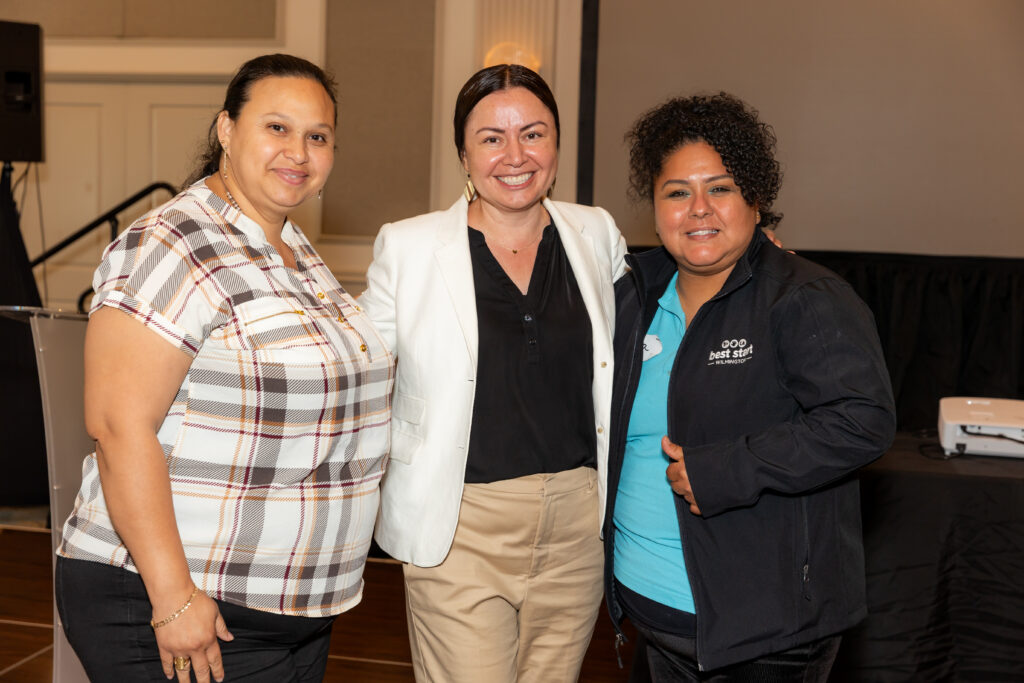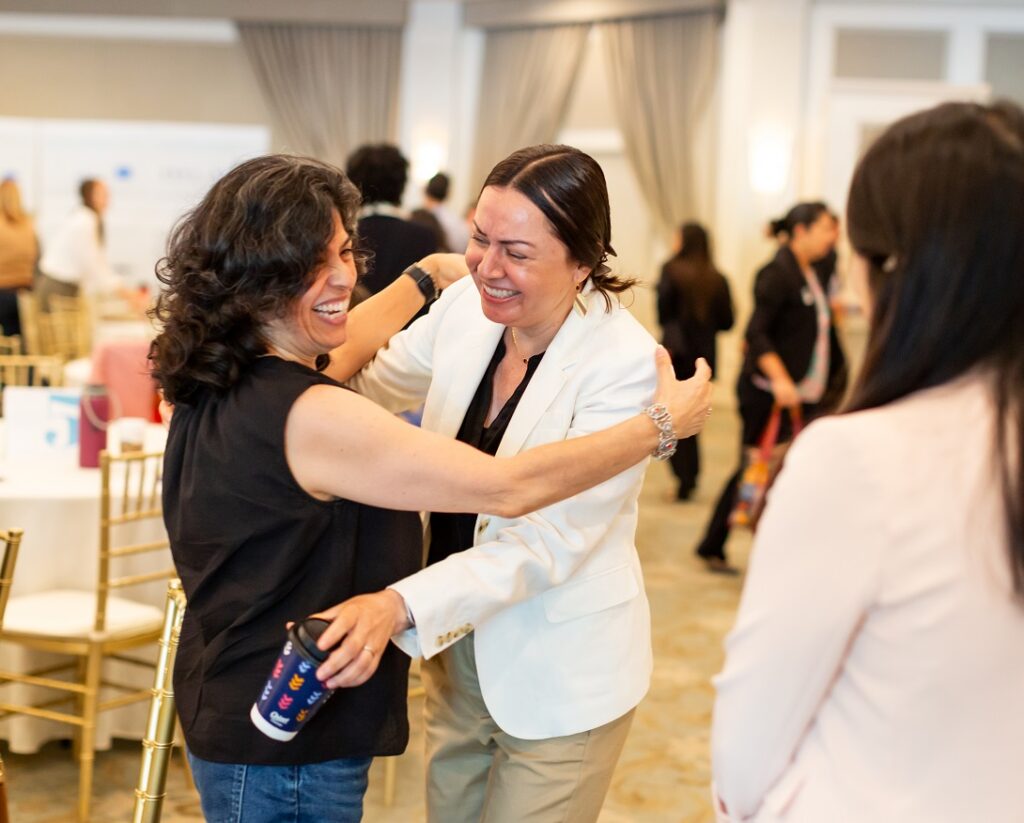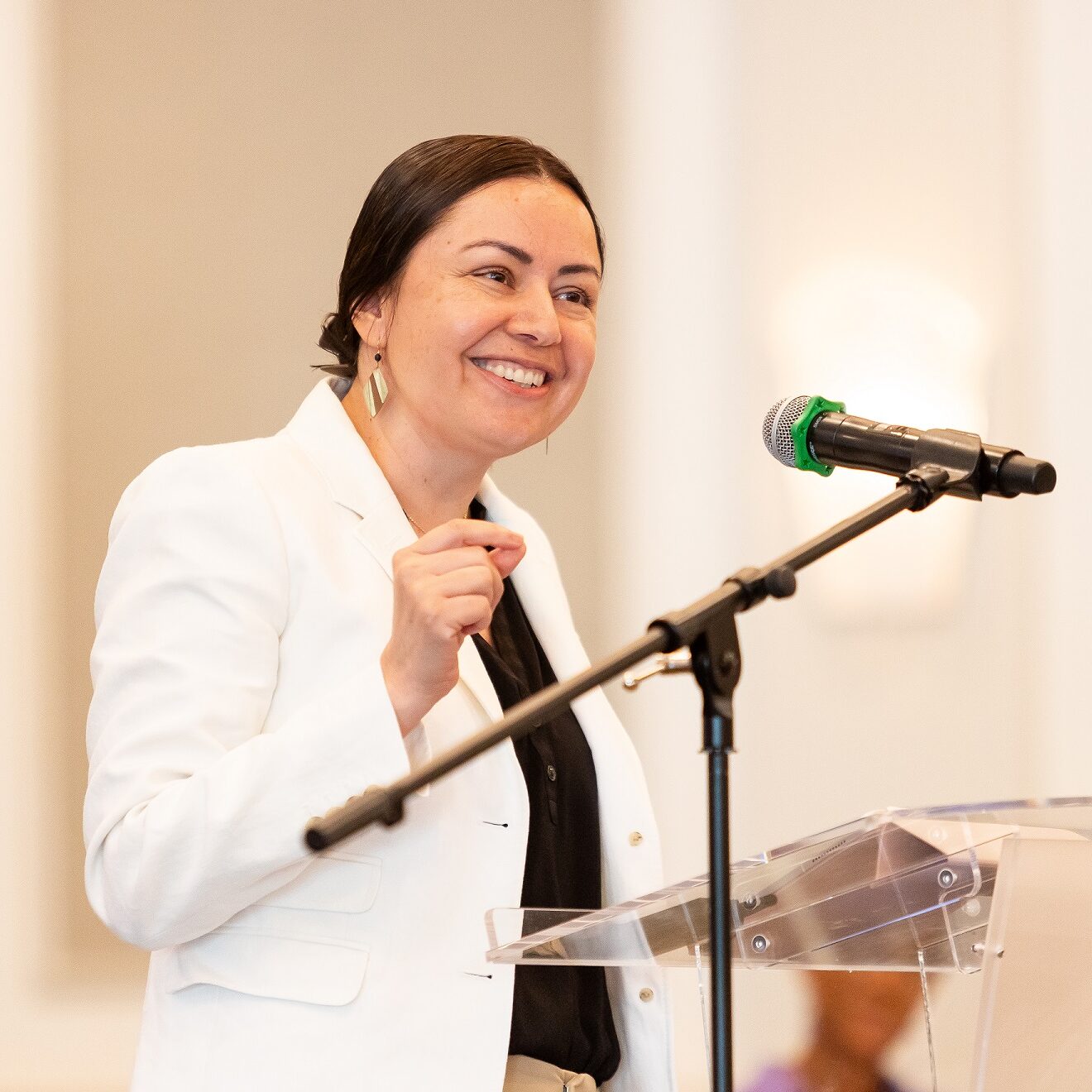November 21, 2024
One of the highlights at First 5 LA’s Board of Commissioners meeting this month was a discussion on the four initiatives that will be used to implement First 5 LA’s 2024-2029 Strategic Plan. Based on input from community members and partner organizations, the four initiatives will guide First 5 LA’s work in 2025.
We recently caught up with First 5 LA President and CEO Karla Pleitéz Howell to learn more about the vision behind these initiatives and how they aim to address the challenges faced by young children and their families
Good morning, Karla! Given that it’s 8:30 am right now, this might be an appropriate question: What gets you out of bed every day?
(Laughs) I really love that question! My family really keeps me grounded. I have two little ones, and just seeing their development, their joy for life, and how much relationships and love matter — that’s the ultimate motivator, those two little munchkins.
And then there’s my job. I love that I get to work on my life purpose. I’ve always prioritized children and family advocacy because I believe this is where we lay the foundation for the society we strive to build – one rooted in connection, equity and shared values. It’s through this work that we nurture the future and create the communities we all hope to be part of.
What do you think are the biggest challenges facing young children and their families today? Also, how will First 5 LA strategic plan address them?
In terms of challenges, I think our society needs to consider the inequitable distribution of opportunity. First 5 LA recently conducted a landscape analysis to assess the systemic lack of opportunities for children and families. The data clearly showed that systemic inequities affect many families, such that some of the most important basic needs — food, housing and health care — were not being met. When that happens, it has a tremendous negative effect on the development of a young child’s brain and on a family’s ability to ensure their child can thrive.
At the same time, in any conversation about the challenges experienced by young children and their families, those of us who advocate for and serve these families must remember that they bring tremendous assets to the table as well. So, I always like to start with that in mind: families are rich in strengths, wisdom and experiences that are key to navigating and overcoming challenges.
Can you share how the initiatives and tactics developed for the 2024-2029 Strategic Plan will improve outcomes for young children?

Karla stands with community representatives at the June 21st convening.
I believe that when families, communities, and systems work together, we can really create transformative change for our children. In our Strategic Plan, engagement with diverse partners has been crucial to building out our initiatives and tactics, which are tied to Maslow’s hierarchy of needs. Maslow’s hierarchy reminds us that meeting basic needs like food, safety, and belonging creates the foundation for individuals and communities to thrive and reach their full potential. Each initiative embodies the philosophy of Maslow’s hierarchy by focusing on prevention as the essential first step – addressing basic needs like safety, housing and food security to build a stable foundation that supports family stability and long-term well-being.
The four initiatives begin with prevention — centering strengths to address root causes and ensuring that families have access to resources like housing and other basic needs. We’re looking to help prevent a crisis when there are structural inequities.
The second initiative, and one I’m very excited by, focuses on building vibrant environments to help children thrive. It’s about creating safe, flourishing spaces where children can play and experience joy, as well as have access to healthy foods.
The third initiative focuses on promoting maternal and child well-being to ensure joyous births for all mothers, especially in communities where we see the most significant disparities. This includes working with Black birthing families. In addition, this initiative also emphasizes home visiting and early intervention.
Last but not least is our Whole Child, Bright Futures initiative, which focuses on expanding access to culturally responsive, high-quality early care and education that prepare our children for lifelong success.
The Strategic Plan and its initiatives emphasize collaboration and partnership as the key to shaping and achieving First 5 LA’s objectives and addressing challenges surrounding poverty, geography, and racial equity. What do you think the potential impact will be like when like-minded organizations come together around these priorities, both within and outside of First 5 LA?
Disparities, barriers, and inequities persist across racial, gender, economic and regional lines, limiting opportunities for too many families. First 5 LA is committed to addressing these systemic challenges, recognizing that their scale demands collective action and aligned contributions from all sectors to create lasting change. If we want to create change to increase opportunity for all, we have to work together.
That’s why First 5 LA is committed to partnerships with those who are already doing some of this work — to amplify their voices and to lead efforts when community members need us to. I think when like-minded organizations come together to address critical challenges of poverty, gender, geography and racial equity, the potential impact can be transformative — not just for individual children and families, but entire communities. Working together, we can amplify our collective impact and break down the systemic barriers that have keep too many children from reaching their full potential.
The concept of social movements is one of the planned strategies being put forth. What is the hope for this collective advocacy? How can people get involved?
For me, a social movement is more than just building awareness; It’s about taking action — starting with our communities, advocating for policies that address root causes and together creating a groundswell of support that moves all of us toward lasting change.

Karla connects with a community member at the June 21st event.
The social movement strategy within our Strategic Plan is, first and foremost, about elevating the role of families and communities, especially those who have been historically and systemically marginalized. They must play a leading role in shaping the policies and systems that affect them. By supporting an early childhood social movement, our hope is that we can galvanize a powerful collective of voices that center on young children and families.
Every voice, every story, every action matters. If we are going to commit to ensuring children and families have what they need to thrive, everyone needs to join in.
Is there anything else you’d like readers to know about First 5 LA’s work ahead?
First of all, I want to say that it was very important for all of us that the initiatives and tactics we developed came from community members and the folks working on behalf of children and families. That’s why I’m really proud of the First 5 L A Team who have been working with families and communities to gather their insights and thoughts.
As we head into 2025, I want to share that communities and families will continue to remain at the heart of our work. We look forward to listening to them, partnering with them, and taking action to address their priorities.
So this is an open invitation: First 5 LA is ready to work in partnership with those committed to creating a better nation for our children and families.
# # #








